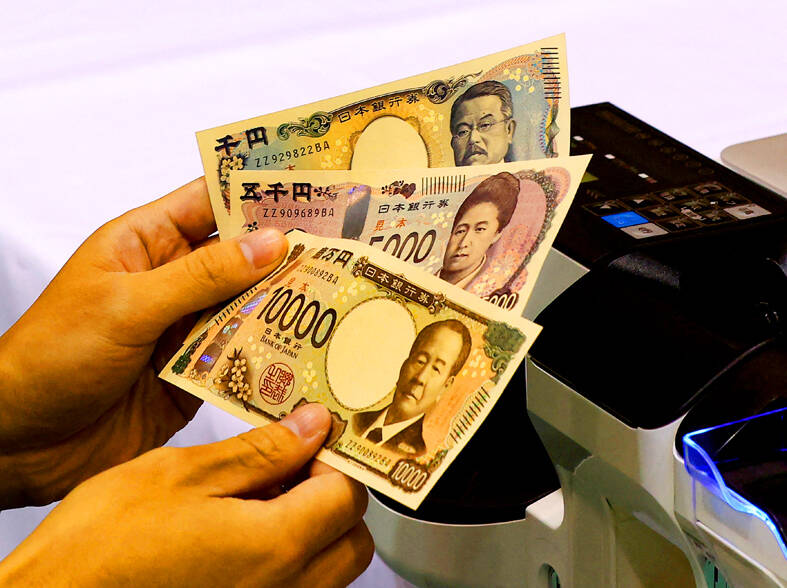The yen on Friday strengthened on news that Kazuo Ueda was set to become the next Bank of Japan (BOJ) governor, but pared gains after he said the central bank’s monetary policy was appropriate.
The Nikkei had earlier reported the government would nominate academic Ueda to the BOJ’s top job, sending the yen surging across the board as markets anticipated a possible earlier end to ultra-loose monetary policy.
However, in comments streamed online by Nippon TV, Ueda said the central bank’s current easy monetary policy was appropriate and that it should continue, prompting some of the earlier yen strength to be reversed.

Photo: Reuters
The dollar sank as much as 1.2 percent to ¥129.8, but closed down 0.11 percent at ¥131.40.
The euro and sterling both fell more than 1 percent against the Japanese currency, but settled down at 0.73 percent (¥140.27) and 0.63 percent (¥158.42) respectively.
The New Taiwan dollar fell 0.23 percent against the yen to ¥4.3572.
The BOJ shocked markets in December last year when it raised the cap on 10-year government bond yields to 0.5 percent from 0.25 percent, doubling the band it would permit above or below its target of zero.
Since then, speculation has gathered pace that the BOJ could adjust or scrap its yield curve control policy, even though it refrained from any changes at its last meeting.
BOJ Deputy Governor Masayoshi Amamiya had been the front-runner to replace incumbent BOJ Governor Haruhiko Kuroda, but the Nikkei reported that he had declined the job.
“Markets had been expecting Amamiya to come in and pick up where Kuroda left off,” said Simon Harvey, head of foreign-exchange analysis at Monex Europe.
“The BOJ’s exit from ultra-easy monetary policy is still highly dependent on what happens during the spring wage negotiations, but a new regime could mean there’s no love lost on the ultra-loose policy side,” he added.
The US dollar index, which measures the greenback against six currencies including the yen, was up 0.35 percent at 103.58. For the week, the index gained 0.64 percent, its second straight positive week and a run it has not had since October last year.
The NT dollar on Friday fell 0.23 percent against the greenback, losing NT$0.068 to close at NT$30.136. Turnover totaled US$1.073 billion during the trading session. The NT dollar was down 0.48 percent from the previous week’s NT$29.990.
The pound fell 0.5 percent at US$1.2060 after the UK managed to avoid a technical recession, with the economy showing zero growth in the final three months of last year.
The euro fell 0.6 percent to US$1.0679, falling 1.11 percent from the previous week for a second straight week of losses.
Additional reporting by staff writer, with CNA

SEMICONDUCTORS: The firm has already completed one fab, which is to begin mass producing 2-nanomater chips next year, while two others are under construction Taiwan Semiconductor Manufacturing Co (TSMC, 台積電), the world’s largest contract chipmaker, plans to begin construction of its fourth and fifth wafer fabs in Kaohsiung next year, targeting the development of high-end processes. The two facilities — P4 and P5 — are part of TSMC’s production expansion program, which aims to build five fabs in Kaohsiung. TSMC facility division vice president Arthur Chuang (莊子壽) on Thursday said that the five facilities are expected to create 8,000 jobs. To respond to the fast-changing global semiconductor industry and escalating international competition, TSMC said it has to keep growing by expanding its production footprints. The P4 and P5

DOWNFALL: The Singapore-based oil magnate Lim Oon Kuin was accused of hiding US$800 million in losses and leaving 20 banks with substantial liabilities Former tycoon Lim Oon Kuin (林恩強) has been declared bankrupt in Singapore, following the collapse of his oil trading empire. The name of the founder of Hin Leong Trading Pte Ltd (興隆貿易) and his children Lim Huey Ching (林慧清) and Lim Chee Meng (林志朋) were listed as having been issued a bankruptcy order on Dec. 19, the government gazette showed. The younger Lims were directors at the company. Leow Quek Shiong and Seah Roh Lin of BDO Advisory Pte Ltd are the trustees, according to the gazette. At its peak, Hin Leong traded a range of oil products, made lubricants and operated loading

Citigroup Inc and Bank of America Corp said they are leaving a global climate-banking group, becoming the latest Wall Street lenders to exit the coalition in the past month. In a statement, Citigroup said while it remains committed to achieving net zero emissions, it is exiting the Net-Zero Banking Alliance (NZBA). Bank of America said separately on Tuesday that it is also leaving NZBA, adding that it would continue to work with clients on reducing greenhouse gas emissions. The banks’ departure from NZBA follows Goldman Sachs Group Inc and Wells Fargo & Co. The largest US financial institutions are under increasing pressure

STIMULUS PLANS: An official said that China would increase funding from special treasury bonds and expand another program focused on key strategic sectors China is to sharply increase funding from ultra-long treasury bonds this year to spur business investment and consumer-boosting initiatives, a state planner official told a news conference yesterday, as Beijing cranks up fiscal stimulus to revitalize its faltering economy. Special treasury bonds would be used to fund large-scale equipment upgrades and consumer goods trade-ins, said Yuan Da (袁達), deputy secretary-general of the Chinese National Development and Reform Commission. “The size of ultra-long special government bond funds will be sharply increased this year to intensify and expand the implementation of the two new initiatives,” Yuan said. Under the program launched last year, consumers can